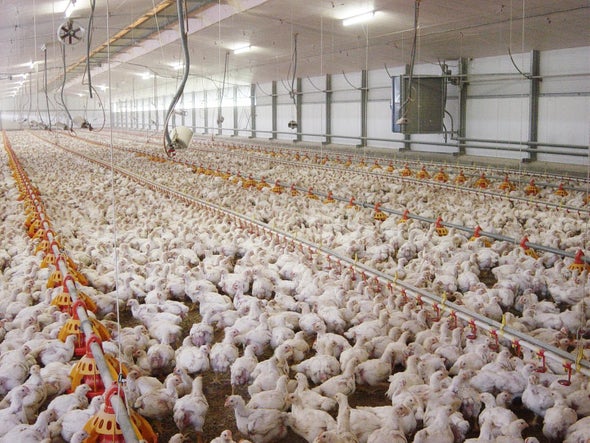This is Scientific American — 60-Second Science. I'm Christopher Intagliata.
Hundreds of millions of years from now, when humans are probably long gone, what sort of geologic record will we leave behind for future archaeologists? Plastics, sure? Concrete, maybe? How about: (CLIP: chicken ad montage: "The tasty tender chicken.""Great chicken!""Woo! Chicken!")
Yep, chicken. Humanity consumes some 66 billion birds a year. Billion, with a B. The mass of chickens on the Earth is so big... it beats the mass of all other birds combined.
"The numbers are astonishing." Richard Thomas is an archaeologist at the University of Leicester, who writes with his colleagues in the journal Royal Society Open Science that chicken bones could be a unique signifier of our era...known as the 'Anthropocene.'
Thomas says our chicken-industrial complex can be traced back to a program in the late 1940s, called the "Chicken-of-Tomorrow" program.
(CLIP: Chicken-of-Tomorrow archival audio: "Yes, indeed, chickens and eggs are a big business. And like big business there's a serious effort to improve the product. A three-year program to breed a better chicken is now being carried on.")

"They came up with this fast-growing meat chicken." Then, in the decades to come, selective breeding, gene editing, antibiotics and new types of feed and housing helped maximize chickens' weight gain even more. "The chickens of today are something like four times heavier than the original broiler chickens of the 1950s."
The upshot, he says, is these bigger-boned broilers are huge compared to the wild red jungle fowl they're descended from. And modern chickens will stand out in the fossil record, for their size and especially their ubiquity.
"We're gonna find these huge middens, as we'd call them archaeologically, these huge rubbish heaps that are gonna be filled with the fossilized remains of chickens. So they're going to be the overwhelming animal species we find."
And that, folks, may be the foremost legacy that human greatness leaves behind. And all without solving one of the most enduring mysteries of all.
(CLIP: Chicken-of-Tomorrow clip: "After all these years, whether the chicken or the egg came first is still the subject of a lot of good-natured debate.")
Thanks for listening for Scientific American — 60-Second Science. I'm Christopher Intagliata.











